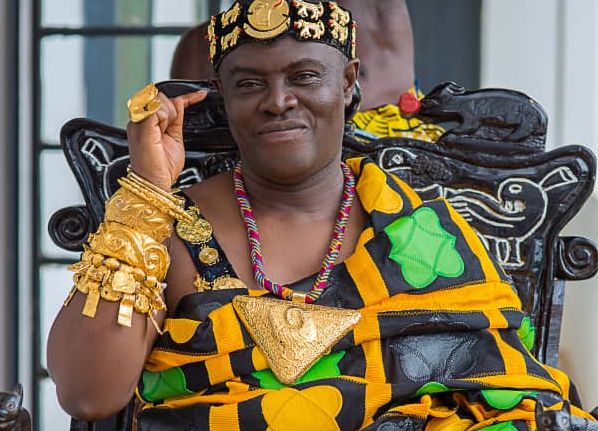
Dormaahene chalks 20
In 1999, a heated succession race for the Dormaa Stool ensued following the death of Osagyefo Oseadeeyo Dr Agyemang Badu.
There were four contestants and in the final analysis, a 33-year-old private legal practitioner in Sunyani, Mr Daniel Mensah, was chosen and enstooled as the Omanhene with the stool name, Osagyefo Oseadeeyo Agyemang Badu II.
Advertisement
What a scene it was when the chiefs of the Aduana Clan in the country led by the then Esumejahene, Odeneho Oduro Numapau II (now deceased), introduced the young lawyer to a gathering of chiefs and people.
Twenty years on, tomorrow, Saturday, December 21, 2019 in the historic town of Dormaa Ahenkro, Osagyefo Oseadeeyo Agyemang Badu will not only celebrate his 20 years on the stool with a grand durbar, but will be doing so alongside his sister and Queenmother of the Dormaa Traditional Area, Odeneho Akosua Fima II, who is also 20 years on the stool.
Who are the Dormaas?
In the words of Osagyefo Dr Agyemang Badu, the Omanhene of the Dormaa Traditional Area, “Dormaa has a unique and complex history and we can say with certainty that it is the only traditional state in Ghana whose migration in search of settlement took a longer distance than any other clan in West Africa”.
Historical records say the search for the settlement of the Dormaas covered a long distance and took a long period of time running into a quarter of a century.
The Dormaas are of the Aduana Clan of the Akan people of Ghana. Indeed, the Dormaahene is acknowledged to be the “Piesie” or first born of the Aduana Clan.
According to www.dormaaman.com, the Dormaas formed part of the Akwamu Empire which for some time became the most powerful kingdom in the Gold Coast.
The Dormaas, then Akwamus, first settled in Cote d’Ivoire from where they moved to establish their first capital town at Twifo Heman to the north-west of Cape Coast.
Their movement took them through major settlements at Obo, Obomeng, Asumegya, Suntreso. Abampredease (Bomaa) and back to Gyaman in the Cote d’Ivoire.
Finally, they settled at Warn Pamu which was renamed Dormaa-Ahenkro in 1949.
As at now Dormaa comprises about 140 towns and villages located in six administrative areas in the Bono and Ahafo regions
Peace and stability
Generally, the Omanhene has been able to maintain peace and stability in the Dormaa state. This is very key because once he did that, it propelled him to do other things to help his people.
Among chieftaincy disputes he has settled includes one at Dormaa Akwamu, Aboabo Number 4, Nsuhia and Chiraa.
“Presently with the exception of Bomaa where the people say they don't like the chief, I can say that there is no chieftaincy dispute in the kingdom,” the Dormaahene told me during an interaction at his palace in Dormaa Ahenkro last Saturday.
Judicious use of resources
On ascending the stool in 1999, Osagyefo Agyemang Badu instituted the Dormaaman Educational Endowment Fund (DOMEF). To date, the fund has supported about 4,000 people with bursaries and scholarships.
“If you support brilliant needy students, you spur growth,” he emphasised.
He admits that the central government alone cannot do all so the traditional council, of which he is the President, has given support to educational institutions in the form of cement, computers and other materials.
He had also applied resources of the traditional council to construct water closets in some of the schools in communities such as Wamfie and Dormaa Ahenkro.
Osagyefo Agyemang Badu is a traditional ruler who strongly believes that the occupant of a stool should try and map out strategies that will improve infrastructure in his domain because the central government alone cannot do it all.
"Of course we are partners in development, and the fact is that we hold the land in trust for our people. The land is not for us so we should use the resources to better the lives of the people.
“The Dormaa state has a lot of resources. Even if you go to Sunyani, a good chunk of the land there belongs to our stool, so the revenue that comes to the stool, we try to use it judiciously so that we will be able to provide some of the infrastructure for our communities,” he said.
Last week, a new divisional police headquarters which was financed with stool land revenue was handed over to the Ghana Police Service.
Preservation of forests
The Dormaahene is a champion of preservation of forests. He has planted a lot of timber species and placed an embargo on mining, whether small scale or large scale in his traditional area.
Advertisement
He says until the nation is able to fashion a system where Ghanaians will get an appreciable chunk of the proceeds from mining, he would not allow mining in his area.
“My land is full of gold, right from Bomaa to Dormaa; it is full of gold deposits. Bomaa shares a boundary with Newmont Mines but I won't allow anyone to come to my area to mine unless I know how much Ghanaians are going to get and know that the mining won't affect my people, their livelihoods, their water, the air and the environment,” he said.
Sports
Aware of the fact that sports is one area of interest for the youth and which generates employment, the Dormaahene, in conjunction with the district assembly, has instituted measures to develop sports infrastructure.
A stadium that can seat 6,000 spectators and with a doping centre has been constructed at Dormaa Ahenkro. It is the home ground of Aduana Stars FC, a premier division team belonging to the traditional council.
Advertisement
The stadium has hosted CAF international matches played by Aduana Stars.
Within nine years of Aduana Stars’ participation in the Ghana Premier League, they have won the league two times.




